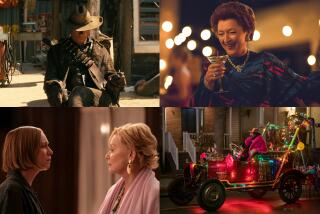Review: Emma Stone and Steve Carell serve up surprising ‘Battle of the Sexes’
Two battles, not one, share the spotlight in the enjoyable and entertaining “Battle of the Sexes,” one you expect and one you do not. And it’s the unexpected one that makes all the difference.
The part that’s expected is the film’s front and center subject, the ostentatious 1973 tennis exhibition between women’s champion Billie Jean King and cheeky gadfly Bobby Riggs.
The event drew 30,000 to the Houston Astrodome, was viewed by the biggest TV audience since the moon landing and is now considered a landmark in gaining respect for women’s sports in general and women’s tennis in particular.
But with gifted and innately likable actors like Emma Stone and Steve Carell as the stars and an audience-friendly script by Simon Beaufoy (“Slumdog Millionaire”) as the starting point, “Battle” is most involving when it deals not with sports or society but the personal struggles both players, especially King, were going through in the run-up to the match.
For King, who considered herself happily married to Larry King (not the TV host; played by Austin Stowell), was having to deal with the romantic attentions of a free-spirited woman named Marilyn Barnett (Andrea Riseborough), attentions that made her unsure if her sexuality was as defined as she’d always thought.
Even Bobby Riggs is intentionally not portrayed as a one-dimensional caricature but rather a troubled man with issues of his own to work out with his unhappy wife, Priscilla (Elisabeth Shue).
“Battle” is directed with a sure hand by the skilled team of Valerie Faris and Jonathan Dayton, masters of well-made storytelling for adults whose work includes the breakout hit “Little Miss Sunshine” and the under-seen “Ruby Sparks.”
Faris and Dayton’s genial expertise is always welcome but especially here, and not only because the outcome of that tennis match is hardly going to keep audiences on the edge of their seats.
Rather it’s because spending time with unredeemed male chauvinists is not scintillating. More than that, even though it knows better, the film de facto encourages audiences to believe problems like these are gone from our society, which is definitely not the case.
“Battle of the Sexes” begins in 1972, with King coming into her own as the dominant force in women’s tennis. She’s just won the U.S. Open, become the first woman to top $100,000 in earnings, and even gotten a congratulatory phone call from President Richard Nixon, a fellow Californian.
But all is not well in tennis land. King’s friend and savvy business person Gladys Heldman (a shrewdly cast Sarah Silverman) shows her a press release announcing that women’s purses will continue to be a tiny fraction of men’s.
Both women see promoter and former men’s champion Jack Kramer (Bill Pullman in a thankless role) as the éminence grise behind this sexist manifesto, and they storm into the all-men’s private club he’s holed up in to confront him face to face.
To see and hear Kramer and his cronies utter inane defenses of income inequality (“men are more exciting to watch,” “men have families to support,” etc.), even if they’re historically accurate, is as dramatically tedious as it sounds, but fortunately “Battle” has more interesting cards to play.
For one thing, incensed by Kramer’s indifference, King and Heldman vow to give female players a league of their own, and soon enough the Virginia Slims tour, sponsored by the cigarette brand, gets off the ground with players like Rosie Casals (Natalie Morales) and the Australian Margaret Court (Jessica McNamee) doing battle along with King.
For another, former U.S. Open and Wimbledon champion Bobby Riggs enters the picture, watching on TV as King gets lots of attention and brooding that none of it is coming his way.
As impishly played by Carell, Riggs is soon revealed to be more scamp than committed chauvinist, an unrepentant hustler who will say or do anything for a bet, even playing while holding dogs on a leash. His “Battle of the Sexes” idea is a result of a desire to get some action and make some money, nothing more.
Though his gambling has placed so much strain on his marriage that he goes to a personal therapist and Gamblers Anonymous meetings, Riggs plays cards with his therapist and harangues his G.A. group, telling them that their problem is not that they gamble but that they’re no good at it. The word “incorrigible” does come to mind.
In preparation for a Virginia Slims press event, Heldman treats all the players to a hair salon visit, where King is ministered to by Barnett, who surprises the tennis player by telling her she’s pretty, a compliment she’s not used to hearing.
Barnett then shows up at one of King’s tournaments, asks her out and ends up in her room. All this may sound predictable, but as directed by Faris and Dayton and played by the gifted Riseborough and a thoroughly committed Stone, it’s done with so much feeling that a sense of privileged intimacy emerges as one of the film’s strengths.
While all this is going on, Riggs is wheeling and dealing, even talking Margaret Court into a match when King initially refuses him. But, as someone says, like it or not “fate is coming at her like a runaway train.” Rising to a challenge she never wanted will become one of the defining moments of Billie Jean King’s career.
‘Battle of the Sexes’
Rating: PG-13 for some sexual content and partial nudity
Running time: 2 hours, 1 minute
Playing: Selected theaters
See the most-read stories in Entertainment this hour »
Movie Trailers
More to Read
Only good movies
Get the Indie Focus newsletter, Mark Olsen's weekly guide to the world of cinema.
You may occasionally receive promotional content from the Los Angeles Times.











